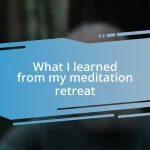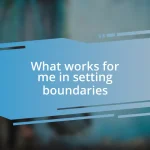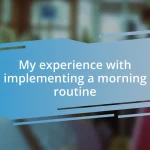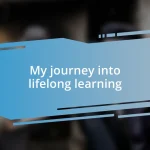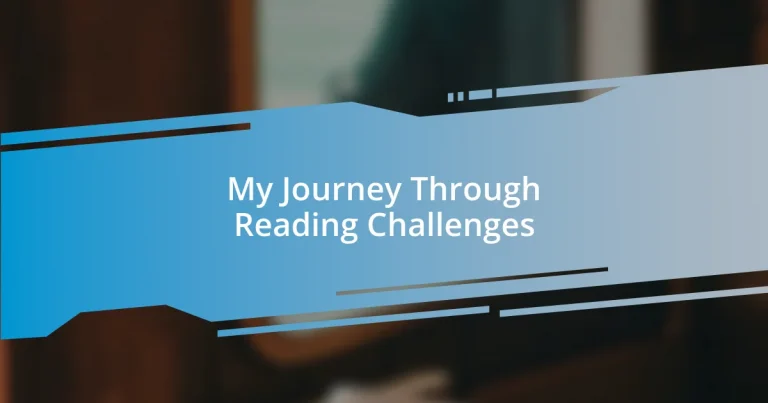Key takeaways:
- Understanding and identifying personal reading barriers, such as distractions and emotional states, is crucial for creating effective reading habits.
- Setting meaningful and flexible reading goals using the SMART criteria fosters a sense of accomplishment and helps maintain motivation.
- Engaging with supportive reading communities and celebrating personal achievements enhances the reading experience and encourages personal growth.
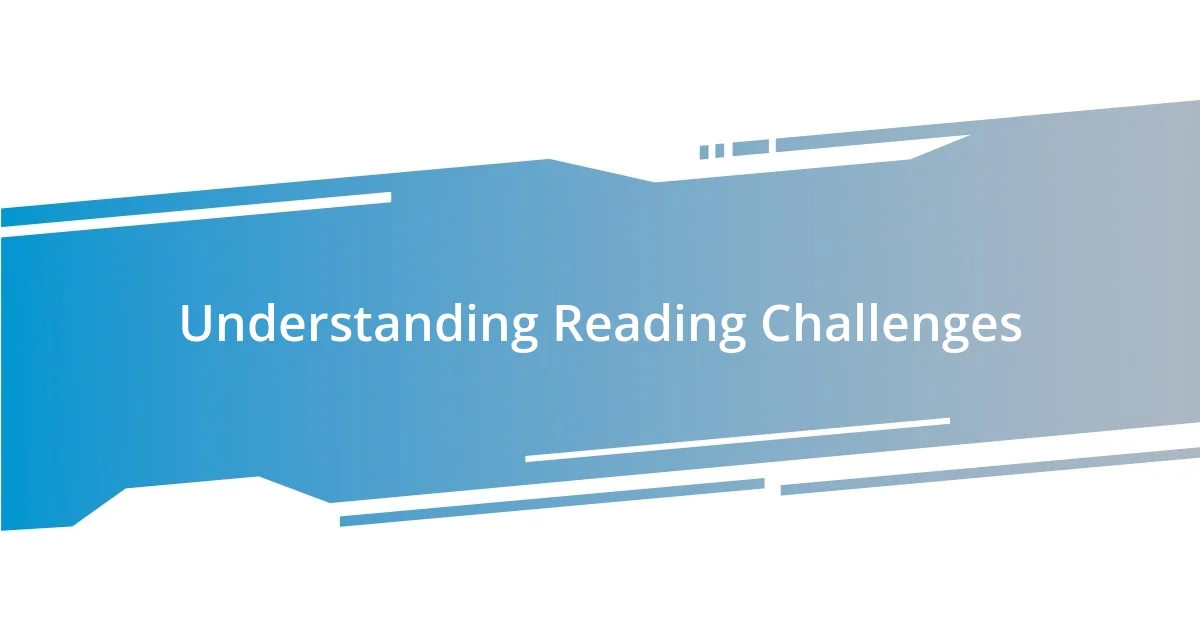
Understanding Reading Challenges
Reading challenges can manifest in various forms, from dyslexia to general comprehension difficulties. I remember a time in school when I struggled to keep up with my classmates during reading exercises. I often found myself wondering, “Why does this feel so much harder for me than for others?” It made me empathize with others facing similar hurdles.
I realize now that understanding these challenges is crucial for both the individual and their support system. For instance, dyslexia doesn’t mean someone is less intelligent; rather, it’s a different way the brain processes written language. Have you ever felt like your mind was racing ahead while your eyes were stuck on the page? That tension is incredibly common among those with reading difficulties, highlighting the need for patience and tailored support.
Additionally, the emotional weight of facing reading challenges can be immense. I vividly recall the frustration and embarrassment that came when I stumbled over words during class. These feelings can lead to avoidance and a lack of confidence, making it essential to create a nurturing environment that encourages growth rather than discouragement. How can we help each other overcome these feelings? By fostering understanding and communicating openly, we can create a safe space where everyone feels empowered to share their reading journeys.
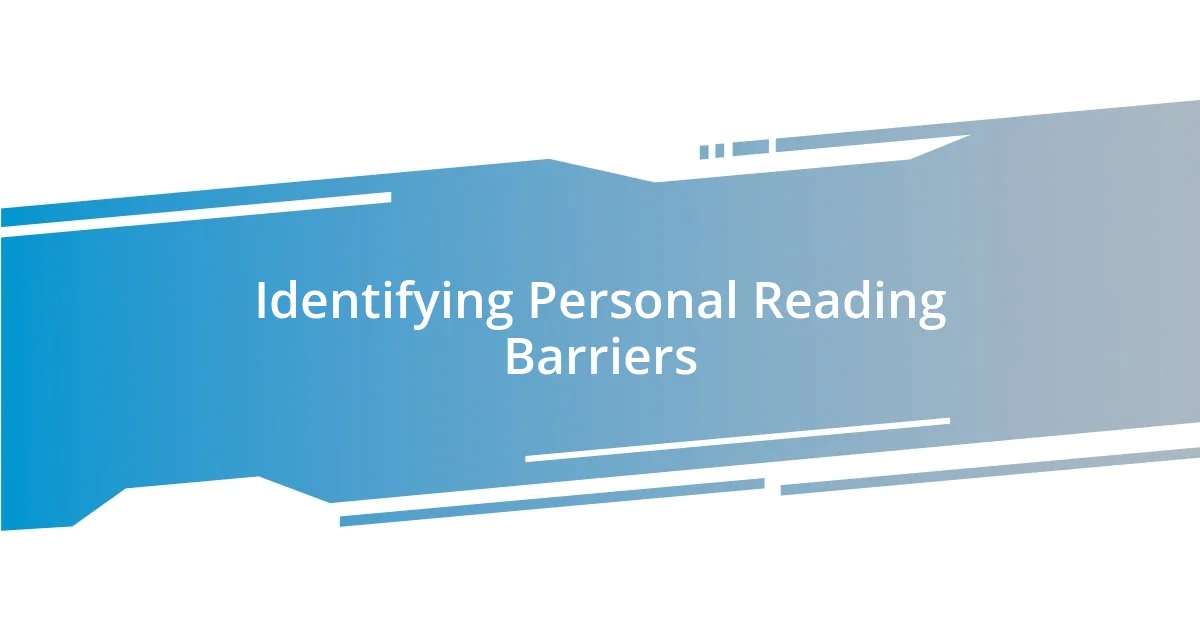
Identifying Personal Reading Barriers
Identifying personal reading barriers is often the first step toward overcoming them. I remember a specific moment when I realized that my environment heavily influenced my reading habits. Whether it was distractions during study time or the pressure to read aloud in front of peers, these factors played a significant role in my ability to focus and retain information. It’s crucial to take a step back and assess not just how we read but the conditions under which we read.
Here are some common barriers to consider:
- Distractions: Noisy environments or interruptions can make it hard to concentrate.
- Time Management: Overcommitting to activities can leave little time for reading.
- Emotional State: Stress or anxiety can hinder the ability to engage with the text.
- Physical Factors: Eye strain or fatigue can affect reading stamina and comprehension.
- Negative Experiences: Past struggles can create a mental block, making it hard to approach reading with an open mind.
Recognizing these barriers helps to create a personalized plan for improvement. I often find that journaling about my reading experiences has been a game-changer for me; this practice allows me to pinpoint what’s working and what isn’t. It’s all about creating the right mindset and setting for your reading journey.
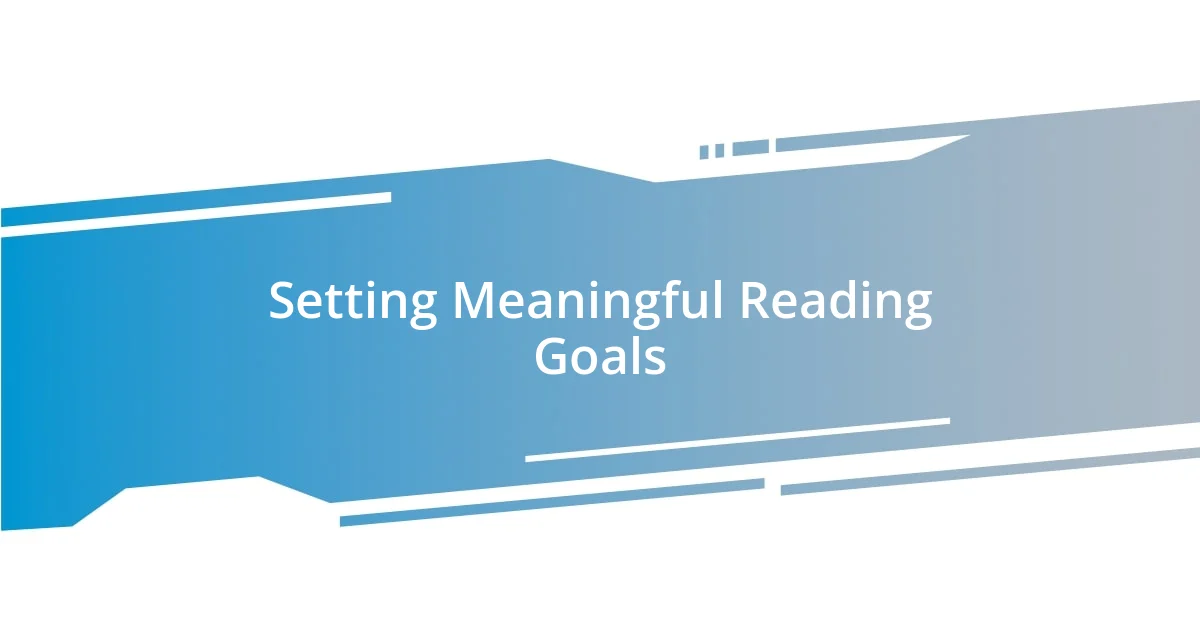
Setting Meaningful Reading Goals
Setting meaningful reading goals is an essential part of overcoming challenges. When I began to take reading seriously, I realized that setting SMART goals—Specific, Measurable, Achievable, Relevant, and Time-bound—made a significant difference. For instance, instead of saying, “I want to read more books,” I defined a goal like, “I will read one chapter daily before bed.” This clarity helped me stay focused and fostered a sense of accomplishment.
Another important aspect is to break your goals down into smaller, manageable steps. I’ve found that when I tried to tackle a hefty novel all at once, I often felt overwhelmed. So, I shifted to setting smaller milestones, like finishing just 20 pages a day. Celebrating these small victories fueled my motivation and transformed reading from a daunting task into a rewarding experience that I genuinely enjoyed.
Lastly, it’s beneficial to keep your goals flexible and reflective of your progress. I recall a time when I aimed to finish three books a month but found that I was only enjoying one book per month. Adjusting my goal was crucial; it allowed me to not only appreciate my reading but also to ensure I was learning and growing from the experience. Remember, it’s about quality, not quantity.
| Type of Goal | Description |
|---|---|
| SMART Goals | Clear, defined objectives that guide and track progress. |
| Milestone Goals | Break down large goals into smaller, manageable milestones. |
| Flexible Goals | Adapt goals based on progress and reflection to align with personal growth. |
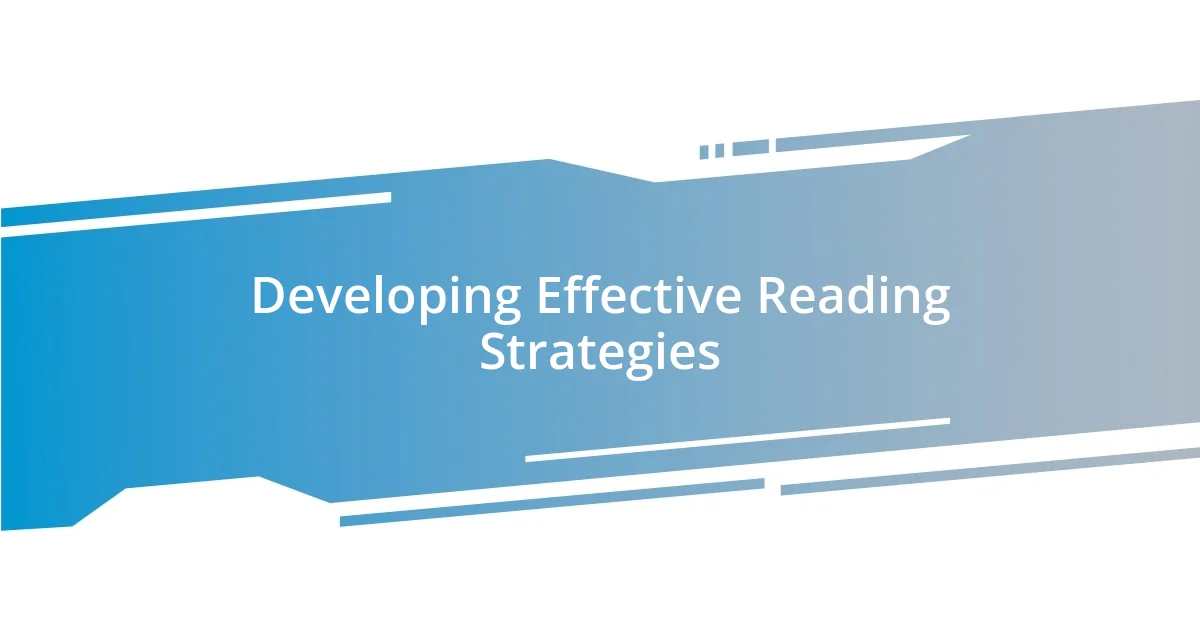
Developing Effective Reading Strategies
Developing effective reading strategies can transform the way we engage with text. Personally, I discovered that annotating while I read serves as a powerful tool for retention. Jotting down thoughts or underlining key points not only keeps me focused but creates a connection with the material that makes it easier to remember. Have you ever noticed how writing things down helps solidify your understanding? It certainly does for me.
Another strategy I’ve adopted is the use of technology to my advantage. I often utilize audiobooks or reading apps that allow me to consume books in various formats, catering to my mood or situation. I remember a particularly hectic week when I had no time to sit down with a physical book. Instead, I turned to an audiobook during my morning commute, which made all the difference. Integrating these formats not only diversifies my reading experience but also helps me catch up on my goals without compromising my daily routine.
Lastly, I can’t emphasize enough the importance of discussing what I read with others. Sharing insights or simply talking about a character’s journey can deepen my understanding and uncover layers of meaning I may have missed. I remember joining a book club and finding that our discussions revealed aspects of the stories that I hadn’t considered before. Have you thought about how conversations can enhance your reading journey? It’s an experience that not only enriches my perspective but also fosters a sense of community among fellow readers.
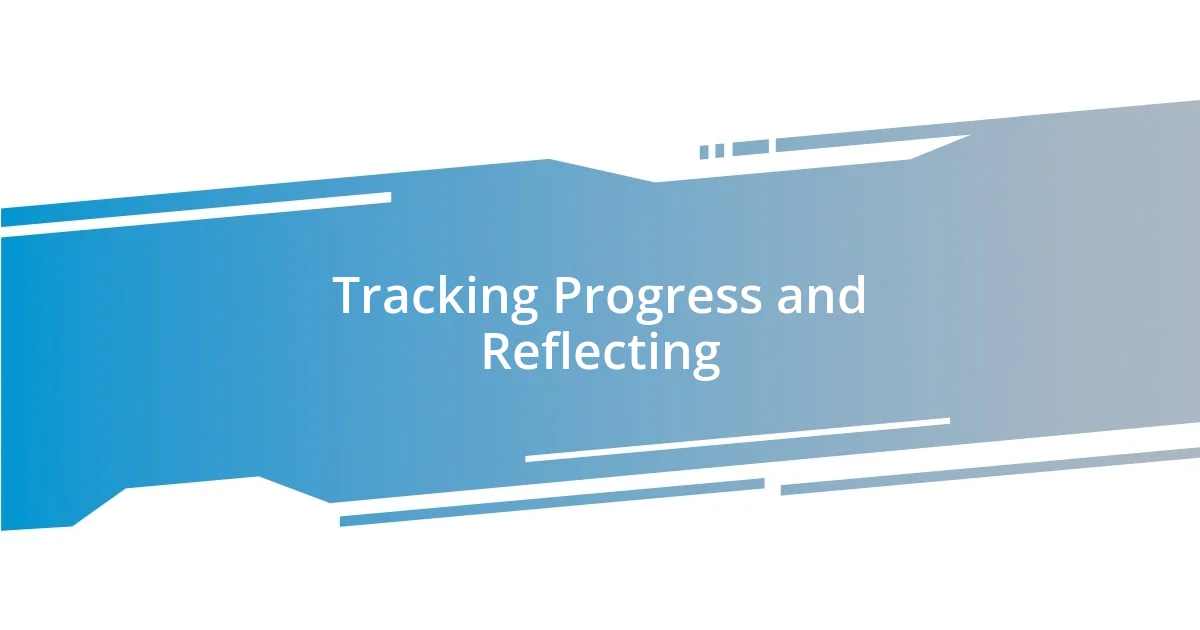
Tracking Progress and Reflecting
Tracking my reading progress has been a game changer for me. I remember keeping a little journal where I would write down the titles of the books I was reading and my thoughts after finishing each one. Reflecting on those entries made me realize how my views changed over time, and revisiting my earlier opinions often surprised me. Have you ever noted how your interpretations can evolve? It’s a fascinating aspect of growth.
Another technique I stumbled upon was using a simple chart to visually track my reading habits. At first, it was just a fun project, but as I filled in the boxes, I started connecting the dots between the books I’d enjoyed and the patterns in my preferences. Interestingly, I noticed that certain genres sparked more joy and enthusiasm than others. Through this process of tracking, I became more aware of what truly resonated with me, making the selection for my next book much easier and more exciting.
Lastly, I’ve found that regular reflections really solidify the lessons I’ve learned through my reading. There was a time when a character’s struggle deeply resonated with me, sparking a real change in my perspective on challenges in my own life. Writing down those reflections after finishing a book not only affirms the impact it had on me but also serves as a reminder to apply those insights beyond the pages. How often do we take the time to really internalize what we read? For me, it’s become an invaluable part of my journey, transforming reading from mere entertainment into a profound personal growth journey.
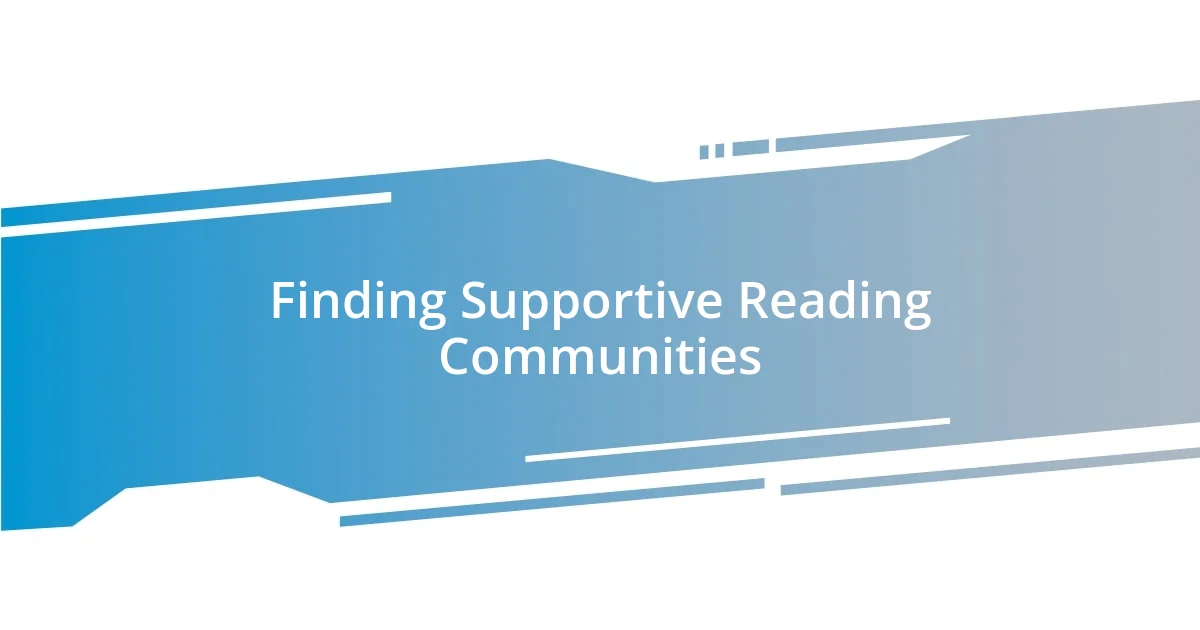
Finding Supportive Reading Communities
Finding a supportive reading community can truly enhance your love for literature and help you overcome challenges. I still remember when I joined an online platform dedicated to book discussions. It was like finding a treasure chest filled with enthusiastic readers who shared my passion. Have you ever connected with someone who just gets your literary preferences? It’s invigorating and can make even the most daunting reads feel lighter.
In my experience, local libraries often host reading groups, and I decided to give one a try. Walking into that room full of diverse faces, all eager to share their thoughts, was surprisingly comforting. It felt like stepping into a safe haven where every opinion mattered. Isn’t it amazing how discussing our different interpretations can shed light on aspects of a book we might have overlooked? Those conversations often linger in my mind, enriching my reading experience long after the chapter has closed.
Moreover, social media has become a powerful tool for finding like-minded readers. I’ve started following several book bloggers who curate their content around specific genres, and it has introduced me to titles I may have missed otherwise. Just the other day, I found a recommendation that resonated with my mood, and it sparked a lively online conversation. Isn’t it funny how sharing can lead to new friendships? Those connections remind me that we’re not alone on this journey, and there’s a whole world of readers out there, ready to support and uplift one another.
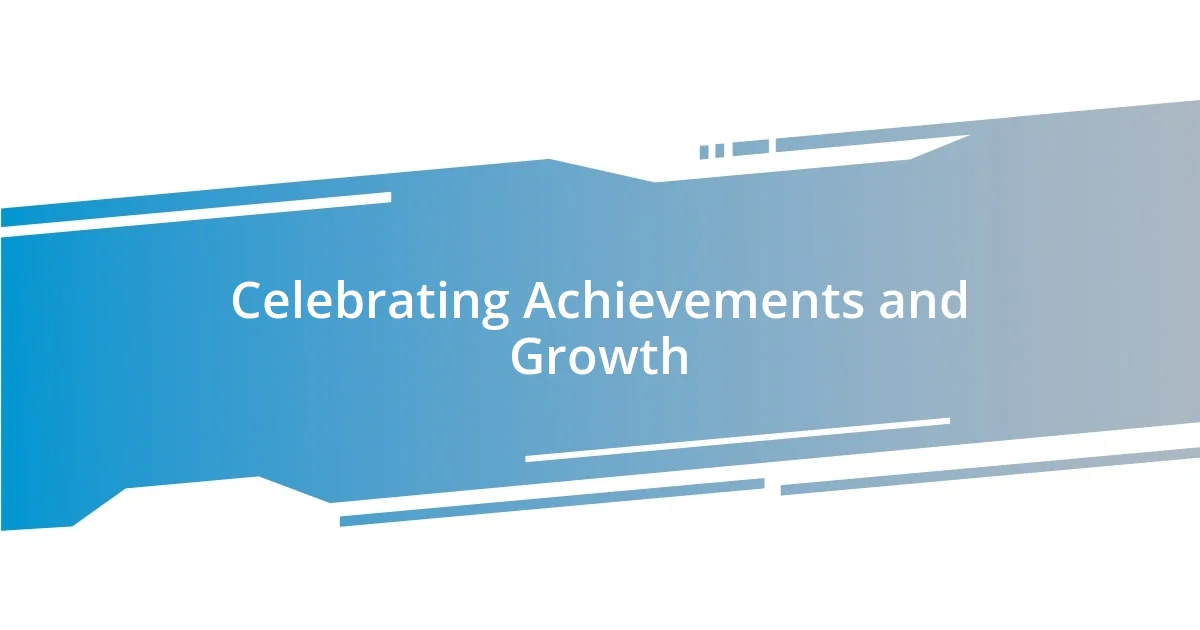
Celebrating Achievements and Growth
Celebrating achievements in my reading journey often feels like a personal festival. I still recall the day I finished my first book over 500 pages long. As I closed the cover, I felt a surge of pride; it was more than just a story—I had conquered a challenge. Have you ever experienced a seemingly small victory that felt monumental? I learned to take a moment to acknowledge these milestones instead of just racing to the next title, and it transformed the way I view my reading endeavors.
Alongside recognizing individual achievements, I’ve found growth in sharing those successes with others. Not too long ago, I shared my latest reading milestone on social media, and the flood of encouragement from friends and fellow readers was priceless. Their excitement mirrored my own, and it created a sense of belonging that made me want to accomplish even more. Don’t you think that celebrating together magnifies the joy of personal success? It’s a reminder that our journeys, while deeply personal, can also be communal, connecting us through shared passions.
Reflecting on my progress led to a deeper appreciation for the growth hidden in the challenges. One particular reading goal I set was to explore different genres, and it was a bit scary at first—what if I didn’t like them? To my surprise, I discovered an affinity for memoirs that opened my eyes to new perspectives on life. Each new genre became a stepping stone, broadening my literary horizons and, ultimately, my worldview. Can you think of a time when stepping out of your comfort zone changed you? For me, this journey has been about much more than books; it’s about embracing new experiences and celebrating the growth that comes with them.
